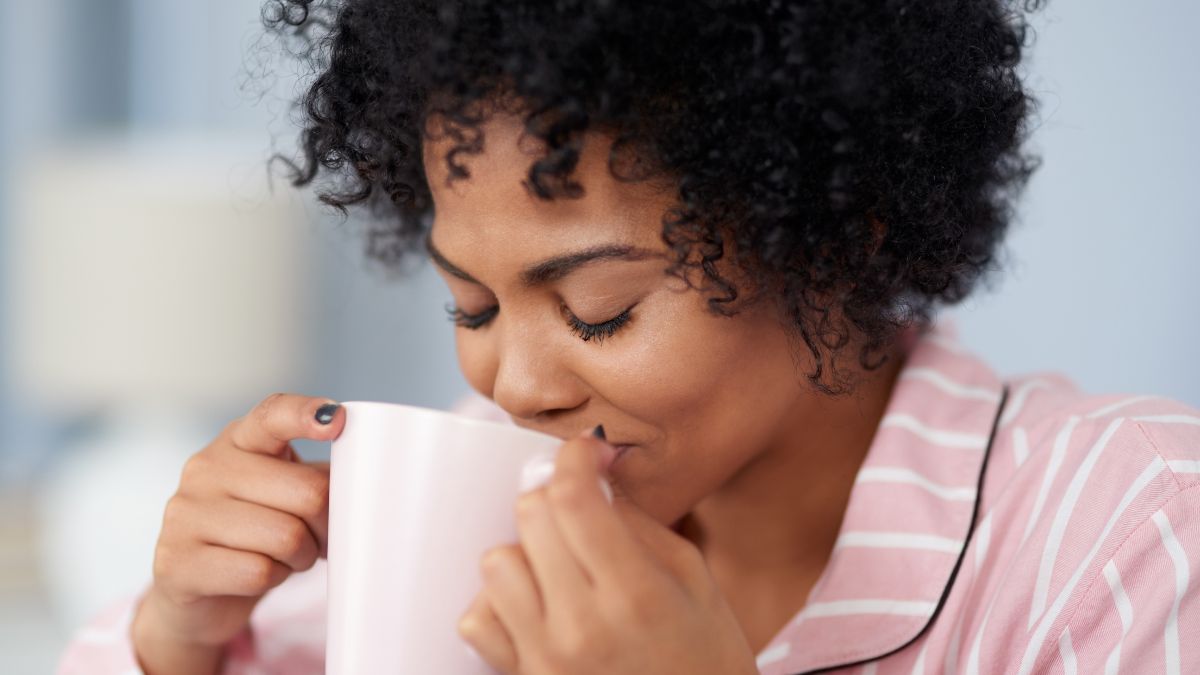
We know how tempting it can be to sip that first cup of joe shortly after you wake up in the morning. But drinking coffee on an empty stomach could cause some unwanted side effects—namely, gastrointestinal upset. Here, experts share their simple recommendations for avoiding an upset stomach from your morning java.
Coffee on an empty stomach: The verdict
Can you drink coffee on an empty stomach? The short answer is yes—but you might not want to (and we invite you to weigh-in in the comments below).
Drinking coffee before you eat food is not inherently dangerous, but it’s not necessarily recommended either. Drinking coffee before breakfast can sometimes lead to gastrointestinal upset due to its acidity, caffeine content and any additives like creamer, sweeteners, milk or sugar. While the negative side effects are not exclusive to drinking coffee on an empty stomach, food may provide a bit of a buffer that curbs symptoms.
How coffee affects your digestion
Many people drink their daily coffee without a second thought. But if you’ve ever experienced unwanted side effects from your morning joe, you may be wondering how coffee impacts your GI system.
It can cause acid reflux
One of the more common effects that may be exacerbated by drinking coffee on an empty stomach is acid reflux. This is because caffeine limits the ability of the esophageal sphincter—the muscle that keeps food from returning up your esophagus—to contract, says Qin Rao, MD, Gastroenterologist at Manhattan Gastroenterology.
Additionally, the caffeine in coffee can increase the production of stomach acid, which can cause or worsen heartburn or gastroesophageal reflux disease (GERD), explains Kenneth Brown, MD, Gastroenterologist at Atrantil.
It can cause loose stools
Coffee stimulates the muscles in the stomach and intestines, which increases contractions and bowel movements, Dr. Brownadds. While this can be beneficial for those dealing with constipation, it can cause diarrhea in some people.
“Some data about this effect is mixed, as 5 percent of the population have IBS-D or irritable bowel syndrome with diarrhea, so anything they consume in the morning will induce them to have a bowel movement,” Dr. Rao points out. “As most people drink coffee in the morning, they naturally attribute this effect to the coffee.”
It can cause a stomachache
Bothersome GI effects may occur faster if you drink coffee on an empty stomach because the body absorbs liquids more quickly than solids, Dr. Rao explains. When you eat food with your coffee, it can help slow gastric emptying and absorption.
Stomach acid also helps break down food before it passes into your intestines to be absorbed. Without any food to break down, the increase in stomach acid caused by coffee consumption can lead to irritation and discomfort, adds Christine Byrne, RD, dietitian and owner of Ruby Oak Nutrition.
How to avoid the side effects of drinking coffee on an empty stomach
Reactions to drinking coffee on an empty stomach will ultimately depend on your individual tolerance and sensitivities. If you find that this habit tends to cause stomach trouble, here are a few things to try:
Time your coffee breaks
Drinking smaller amounts of coffee at a time helps reduce the amount of caffeine and other components in the coffee that may be causing digestive upset, says Dr. Brown.
Additionally, you can drink coffee at different times of the day. In the morning, for example, coffee may stimulate the gastrocolic reflex (which can already be high when you wake). That’s when hormones from the stomach tell the rectum to contract, leading to a bathroom trip, he says. By waiting a bit before indulging, you’ll be less likely to trigger that reflex and the unwanted symptoms that may accompany it.
What’s more, getting into the habit of drinking your coffee after you’ve had your breakfast can be beneficial as there will already be food in your stomach, making GI distress less likely, says Byrne.
Try a new brew
You can also experiment with different brewing methods, as some people find that cold brew or French press coffee causes less stomach discomfort than regular drip coffee, offers Dr. Brown. This is because they tend to be less acidic.
Pair coffee with a morning meal
Having a balanced breakfast with or before your cup of coffee won’t stop reflux issues, Dr. Rao notes, but it can certainly help with stomach trouble.
Jennifer Nicole Bianchini, RD, dietitian with Body to Soul Health recommends including fiber-rich carbs, protein and healthy fat in your morning meal to ward off unpleasant symptoms. For instance, pair your cup of coffee with oats or an egg, some avocado and whole grain toast.
“These foods can help buffer the acidity of the coffee and slow down its effects on motility, allowing your body to absorb nutrients more effectively,” she explains.
This content is not a substitute for professional medical advice or diagnosis. Always consult your physician before pursuing any treatment plan.




